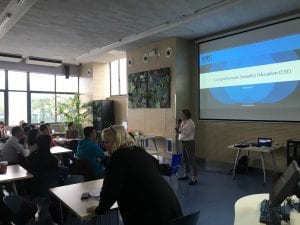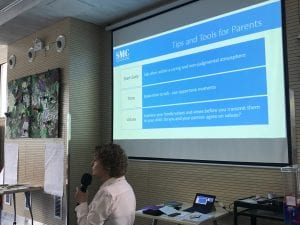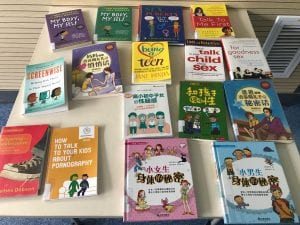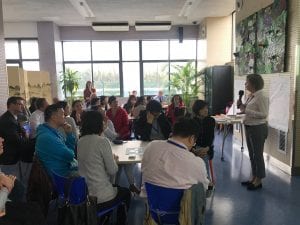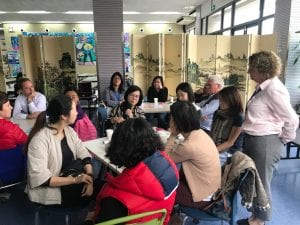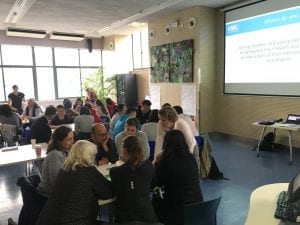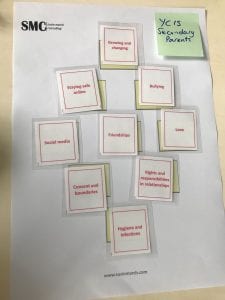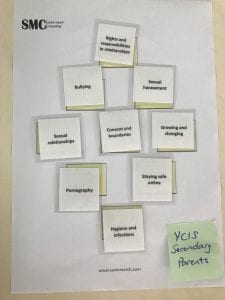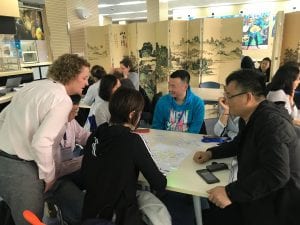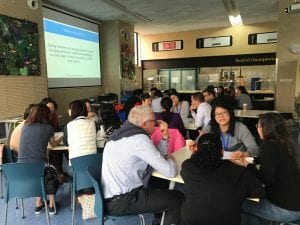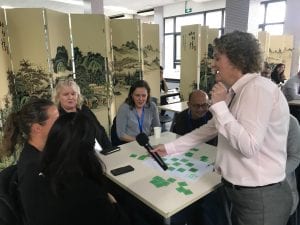 Earlier this month, YCIS Pudong was delighted to welcome back a very special guest, Ms Susie March, a world-renowned Council for International Schools (CIS) Comprehensive Sexuality Education (CSE), and Personal, Social, Health & Economics (PSHE) consultant. During her visit, Ms March met with ECE, Primary, and Secondary parents, as well as Secondary students to help share relevant information in these areas.
Earlier this month, YCIS Pudong was delighted to welcome back a very special guest, Ms Susie March, a world-renowned Council for International Schools (CIS) Comprehensive Sexuality Education (CSE), and Personal, Social, Health & Economics (PSHE) consultant. During her visit, Ms March met with ECE, Primary, and Secondary parents, as well as Secondary students to help share relevant information in these areas.
Ms Susie March’s career began as a practice nurse in the UK’s National Health Service (NHS), where her focus was on sexual health, women’s health, and family planning. When an opportunity came for her family to move to Germany, Ms March’s career took a new trajectory. After spending time at her children’s international school, she saw an element of the school curriculum that she thought needed some extra help: the education of children around their sexual health. This presented her with an opportunity to use her skills to do something positive for the school and its students. Ms March spent the next five years volunteering for the school, during which she completed several courses and earned various pedagogical qualifications. Her reputation grew, and, in 2011, she founded her consultancy business, initially working with schools in Germany, the Netherlands, and France, and now with schools across the world. In October 2017, Ms March spent time with educators at YCIS to help advise on the school’s Well-being programme. This year, she revisited YCIS Pudong to help further build on the school’s now very well-established Well-being programme.
Where should a school start when it comes to CSE and Well-being for its students? According to Ms March, a policy is vital. “For schools to have their programmes supported and not undermined, they need to have a policy in place. So, I help schools to not only support their students but also to put in place a curriculum with a clear policy,” she said. “Schools need to have a child protection policy, and they also need to have a sexuality education policy. We have policies for many things – for bullying, or school trips, for example. The sexuality education policy underpins everything within a schools’ curriculum to do with sex education,” added Ms March.
Having a programme that is integrated into the curriculum and that has recurring elements throughout the school year is key to its success. The programme also needs to develop across the year groups, so a student moving through the school will receive a streamlined and consistent message during their time at the school. Having the whole school on board is crucial for this to work. “What YCIS has done, which is really key, is that they’ve worked as a whole school on the programme,” added Ms March.
During her visit, Ms March talked to students from the Upper Secondary school, focusing on how to help them with student life at school, but also to help prepare them for life after school. “We want to ensure that they have the skills to make the right decisions for themselves”, March added.
In addition to talking with students, Ms March also led sessions with parents of students from ECE, Primary and Secondary. The meetings gave the parents the opportunity to highlight questions and concerns about the subject matter. Ms March described how the sessions created an open dialogue between parents, saying “We did an exercise where the parents looked at over 40 topics that students might need to know about, and they had to rank them. They said what they felt were the most important ones, and what they’d like their children to know about more. It’s a great opportunity for them to talk about this with each other.” Ms March stressed the importance of the partnership that occurs between the parents and the school, and how the CSE and Wellbeing programmes will support, not undermine, their values. “We give the students the tools to make decisions, but the parents still have their values from home that underpin all of that. We need to ensure that parents can be partners in this support for their children. Education by the school is actually such a small element of what happens,” said Ms March. According to Ms Zoe Andrews, School Counsellor and Child Protection Officer (ECE and Primary) at YCIS Pudong, parent feedback had indicated this type of education was very welcomed. According to Ms Andrews, “We had very positive feedback from parents. They were saying ‘We don’t know how to teach our children this, and we appreciate the help and guidance.’”
Ms March also shared some tips for parents on how to approach CSE with their children. For example, what should parents do if they’re asked a difficult question? “My first thing would be to ask them to repeat the question slightly differently”, she said. “‘I don’t quite understand what you mean by that? What do you know about that?’ Because, actually, they might be asking something completely different,” advised Ms March. She also said answers don’t need to be too detailed at first, that parents should avoid being too personal with their responses, and they should never ‘make up’ answers. Being factual, and not being afraid to say when you don’t know the answer are all critical, according to Ms March. What about starting conversations with children? Ms March recommended using the things around us every day to start up conversations, such as books, TV shows, or the radio. Another way to engage young people is to have screen-free (no phones or other devices) dinners together as a family – when possible – and to have a choice of topics that can be discussed throughout the meal. These topics can be pre-written and selected by children, parents, and any other family members at the dinner table.
Overall, it’s safe to say Ms March was impressed by YCIS Pudong’s progress since her last visit, remarking “Wow! From what I’ve seen, the work that has been done in the past year is phenomenal,” she enthused. Ms March’s recent visit was not only educational and insightful for all in attendance, but it also built on the school’s continued efforts to provide the safest possible learning environment for all students and staff.

